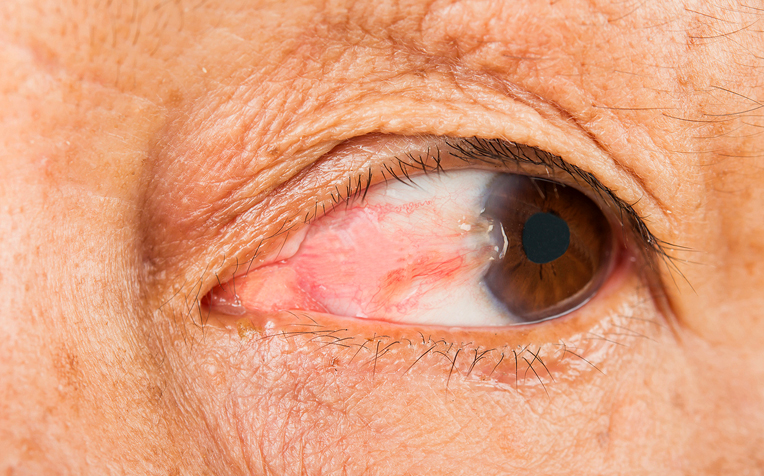There is a white glob growing in my eye. It looks unpleasant and rather scary. It also feels like there is constantly something in my eye. Should I be worried? Or will this go away on its own?

You may have a pterygium. A pterygium is a fleshy and wing-shaped overgrowth of the transparent membrane over an eye’s surface. It may appear white or pinkish, show fine blood vessels and grow from either or both corners of the eyes.
Though a pterygium looks alarming, and its growth cannot be stopped, it is harmless. It requires medical attention only if it causes irritation or — in rare cases — grows big enough to affect vision. Its typical effects, which range from mild to severe are:
- Red or swollen eyes
- Dry, itchy or burning eyes
- The feeling of a sand-like substance stuck in the eyes
Treatment
Most patients do not need any treatment unless they are facing discomfort due to the pterygium. Any
irritation, inflammation or swelling can be managed with ointments or steroid drops, depending on the
level of severity.
While surgery is the only solution to removing a pterygium altogether, it will be suggested only if:
- The ointments or steroid drops do not provide any relief
- The growth affects or threatens to affect your vision
- It bothers the patient aesthetically
The most recommended procedure is a conjunctival autograft surgery. This involves removing the pterygium and transplanting a patch of membrane from the patient’s eye over the surgical site. There are typically minimal complications, and the chances of the pterygium recurring are less than five per cent.
Preventing pterygium, slowing its growth or deterring its return post surgery
The exact cause of pterygium is unknown. However, it is believed to result from long-term exposure to a
combination of factors such as ultraviolet light from the sun and irritants like dust, wind and smoke. The
condition is most prevalent among men between the ages of 20 to 40 who live in tropical climates and
spend a lot of time outdoors. People can safeguard themselves from pterygium by:
- Wearing UV-protecting sunglasses and a wide-brimmed hat even on cloudy days
- Using artificial tears or eye drops if they live in a dry climate
Scan to find out more:
Prof Jodhbir Mehta
Senior Consultant
Corneal & External Eye Disease Department, SNEC
